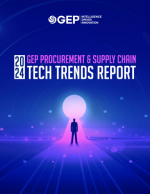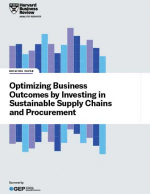Operationalizing Climate and Social Goals in Supply Chain Operations
This report by Harvard Business Review Analytic Services and sponsored by GEP, dives into issues companies are facing as they embark on a sustainability journey, identifying what they need for effective execution to achieve ESG goals.
Operationalizing Climate and Social Goals in Supply Chain Operations
Given the rising importance of environmental, social, and governance (ESG) issues, many organizations are publicly committing to achieving net-zero emissions targets and embracing diversity.
However, operationalizing sustainability is an unprecedented, complex undertaking, especially in supply chain operations, and it has fallen on supply chain and procurement leaders to deliver on these commitments - as it’s within the value chain where many of the greatest sustainability gains can be made.
How can organizations determine success?
They must establish goals, methods, and measures - but first, they need better collaboration and greater visibility into the supply chain ecosystem through smart analytics made possible by the right data at the right time.
This report by Harvard Business Review Analytic Services - Operationalizing Climate and Social Goals in Supply Chain Operations - and sponsored by GEP, dives into issues companies are facing as they embark on a sustainability journey, identifying what they need for effective execution to achieve ESG goals.
What’s Inside:
- How technology, culture, and other issues can hinder organizations transitioning from sustainability goals to execution
- The role of sustainable procurement and supply chain within an organization - with a focus on climate goals and diversity benchmarks within the supply chain - and the impact on people, processes, and technology
- The practices that procurement and supply chain leaders have implemented and the required resources to drive and accelerate sustainability’s day-to-day impact
Having the right tools in place across the entire source-to-pay process is critical, but technology isn’t a panacea.
Organizations need to effectively communicate their ESG vision across the organization and their extended network.
We encourage readers to use this report, sponsored by GEP, to learn how leading companies such as Unilever, Veolia North America, and Xylem have operationalized their sustainability journeys.
It’s a must-read report for supply chain, procurement, finance, and other business leaders who are looking to enhance ESG performance. Get your complimentary copy. Download Now!
What’s Related




Favorites





